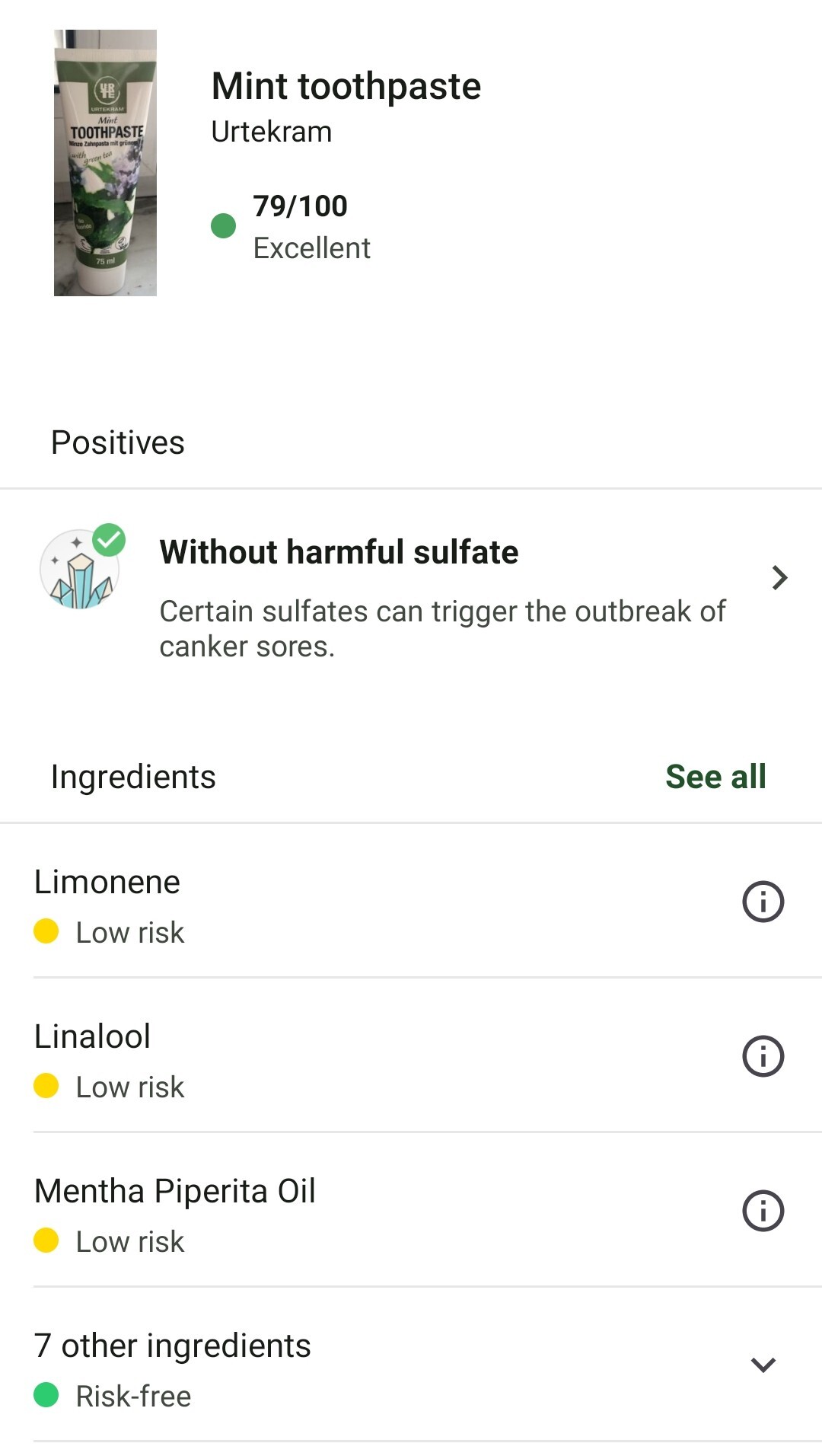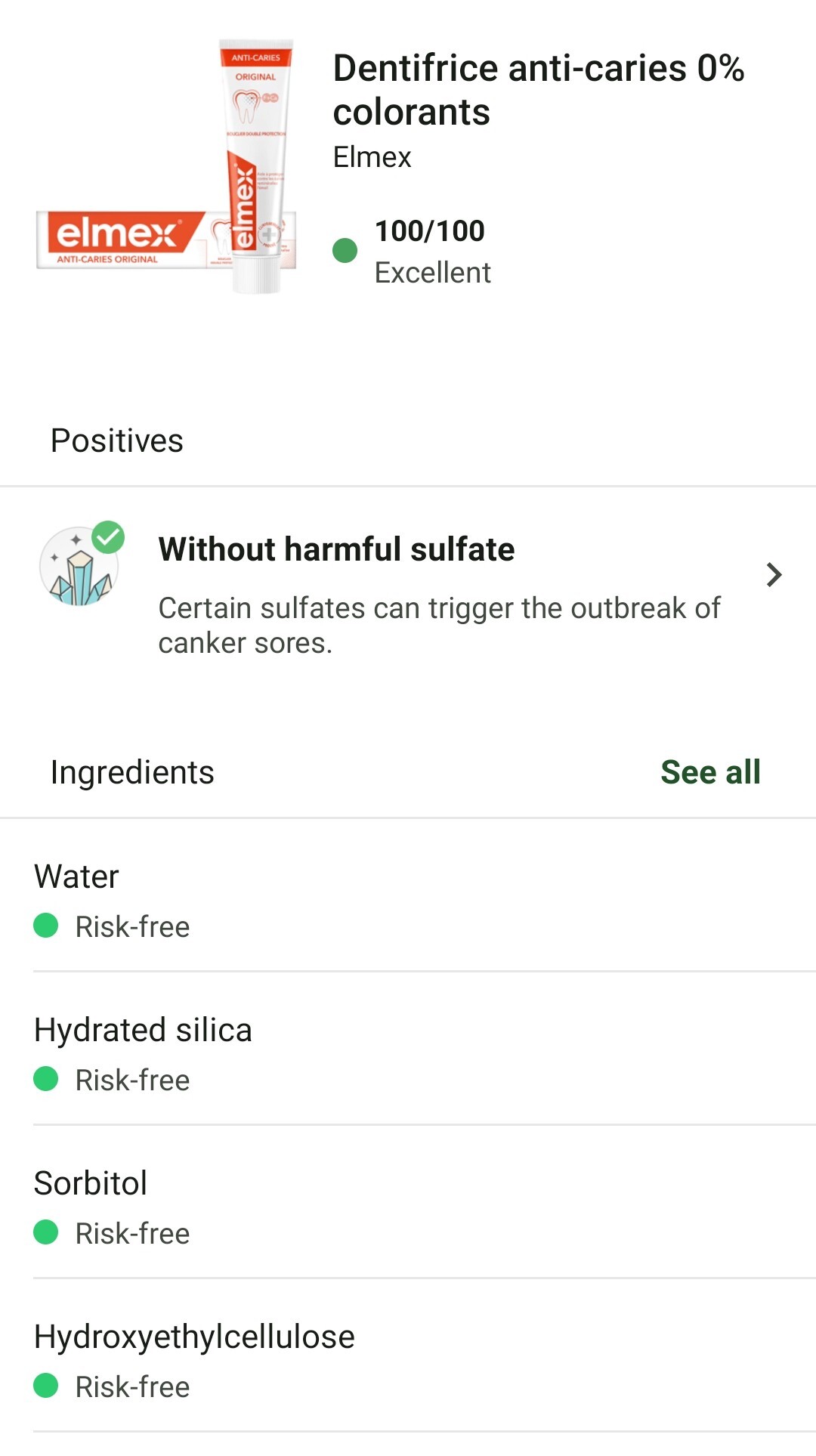damn yes, I checked cartes a month or two ago and it was very buggy for me, seems like it’s being worked on! the UI even looks goood
- 0 Posts
- 25 Comments

 5·1 month ago
5·1 month agoSame as what the others said: in France, non-French EU citizens can vote for EU parliament and municipal elections (electing a mayor). However, you need French citizenship in order to vote for your parliamentary representative (which could be misunderstood as “local” as it is on a district level), and for presidential elections.
I’m actually curious to know why local elections specifically, if it’s an EU directive or just “common” ?

 4·2 months ago
4·2 months agoAccording to Yuka (a food and cosmetics rating system), most brands listed in the OP image do not have a good rating. There are two moderate risk ingredients : Sodium Laurel Sulfate (listed as an irritant and an allergen, present in Botot, some Colgate products, OralB, some sensodyne products and some paradontax products) and Titanium dioxide (listed as potential carcinogen, present in some paradontax and some oral-B, I think it’s for teeth whitening). Having a “Moderate risk” ingredient means your score cannot be better than “Poor”.
The app also lists other potential allergens that are “Low risk” and present in most most products across brands (there are sometimes differences within the same brand). If a product only has low risk ingredients, its rating is usually “Good” or “Excellent”.
I couldn’t find exactly the pictured product, but this danish brand has an “Excellent” rating on all of its products, not a full score because it includes some of the Low Risk allergens. The best rated products are actually from Elmex.


Of course this is just one arbitrary rating system, but it’s quite transparent and you can get all the details for risk for each ingredient, backed by scientific literature. Also the app is free if you want to scan barcodes :)

 5·2 months ago
5·2 months agoI don’t think Wero is comparable to the others, they didn’t have the scope, ambition and backing Wero and the European Payments Initiative have ? It’s limited right now but it just launched, I’m sure more banks will progressively join.

 21·2 months ago
21·2 months agoc’est du role play de président ? je n’y comprends rien

 3·3 months ago
3·3 months agohad a similar experience, but don’t forget that interrail makes you forget about the real price of tickets which iirc are quite the issue

 4·4 months ago
4·4 months ago« C’est vrai que nous avons fait confiance au vendeur » « nous n’y connaissons rien en mécanique. » « Nous avons déboursé 56 000 € »
Ca fait très mal, mais je ne peut que rire méchant aussi. Quelle idée de s’engager sur de tels montants sans une vérification par quelqu’un qui s’y connaît, et surtout avant de faire de telles distances…
Mais plus sérieusement, est-ce qu’il n’y a pas un moyen de se faire rembourser ? Il n’y a pas d’obligation de contrôle technique comme en France ?bien sûr c’est écrit dans l’article 😅 bon courage a eux quand même pour la procédure judiciaire

 3·4 months ago
3·4 months agoSi le site dédié c’est Europresse, alors il existe l’extension Ophirofox sur Firefox/Chrome qui simplifie beaucoup le processus (un bouton apparaît directement sur le site de presse et on a presque l’article en un clic). Et la bonne nouvelle, c’est que ça marche du tonnerre avec Firefox mobile (cf le nouveau bouton “Lire sur Europresse”):

Tout est sur https://ophirofox.ophir.dev/, notamment l’installation sur mobile.

 2·4 months ago
2·4 months agoHm, they have control over the instance but not directly (except if they fork etc) over the software? So comparing to reddit they can’t modify the UI to include ads, can’t inject tracking, etc.

 8·4 months ago
8·4 months agoLe RN réhabilite Jean-Marie Le Pen sans faire de vagues
Clément Guillou
Les dirigeants du RN, qui craignaient une possible « rediabolisation » du parti à la mort de son fondateur, ont salué son parcours sans nuance, encouragés par un discours médiatique et politique très mesuré.
Il l’avait anticipée, visualisée, commentée depuis des années. Jean-Marie Le Pen n’avait rien à craindre de sa propre mort, survenue le 7 janvier. Ses successeurs davantage. Ils ignoraient sincèrement quelle en serait la réception par les Français, la presse, la classe politique, et les possibles retombées politiques. Les chausse-trappes étaient innombrables. Elles semblent, pour le Rassemblement national (RN), avoir été évitées. A bien des égards, la séquence offre une perspective paradoxale : la famille Le Pen a pu gagner en humanité, longtemps son point faible dans les enquêtes d’opinion, au moment même où elle saluait l’œuvre de son représentant le plus détesté et communiait avec les franges radicales de l’extrême droite.
Le mouvement de Marine Le Pen pouvait craindre la division dans ses rangs, entre les cadres et députés ayant adhéré par fascination pour Jean-Marie Le Pen et ceux qui ne l’ont rejoint qu’après son exclusion du parti par sa fille. Comme en octobre 2023, lorsqu’une députée RN avait qualifié le cofondateur d’antisémite, après que Jordan Bardella avait dit l’inverse. Cette fois, le respect dû aux morts a autorisé tous les élus, quelle que soit leur sensibilité, à ne retenir que la part de son héritage la plus appréciable à leurs yeux.
« S’il y a une dissolution en juillet, les adversaires du RN pourront leur reprocher cette solidarité avec Jean-Marie Le Pen. Mais dans deux ans, le temps aura fait son œuvre, estime Nicolas Lebourg, historien spécialiste du Front national. Reconnaître les excès et les polémiques, c’était aussi s’inscrire dans le camp de ceux qui ont osé. » Pour Jean-Yves Camus, directeur de l’Observatoire des radicalités politiques, « tous ceux qui pensaient que le moment de la mort de Jean-Marie Le Pen allait constituer un moment de rupture connaissent mal la psychologie de cette famille politique, où la repentance n’est pas la norme. »
Les croix celtiques évitées
Le déroulement des deux cérémonies d’hommage au défunt, l’une dans son fief de La Trinité-sur-Mer (Morbihan), samedi 11 janvier, l’autre à Notre-Dame du Val-de-Grâce (Paris), cinq jours plus tard, était également craint par le parti. Moments de communion de la famille, ils sont aussi éminemment politiques. Dans le village breton, la cérémonie annoncée « dans la plus stricte intimité » a vu des employés de e-Politic, le prestataire de communication du Rassemblement national, filmer la lente marche de la famille Le Pen vers l’église, comme l’a révélé Libération. Un fascicule revisitant sélectivement l’œuvre politique du défunt était distribué. Plus que tolérées, les chaînes d’information en continu ont pu documenter de près l’émotion familiale.
A Paris, toutes les familles de l’extrême droite française étaient attendues, et craintes par Marine Le Pen. Un important dispositif policier aux abords de l’église, notamment, a permis d’éviter croix celtiques, saluts nazis ou folklore néofasciste, mais pas la présence de nombre d’antisémites patentés. En sortant de l’église, Marine Le Pen a serré quelques mains et arboré un léger sourire qu’elle n’avait plus esquissé depuis la mort de son père.
Dans une interview au magazine de Vincent Bolloré JDNews, convenue avant sa disparition, elle fait une confession d’une ambiguïté absolue, au sujet de l’exclusion de son père en 2015, après la réitération de ses propos négationnistes : « Je me poserai toujours la question : “Est-ce que j’aurais pu faire autrement ?” (…) Je ne me pardonnerai jamais cette décision, parce que je sais que cela lui a causé une immense douleur. » Cette décision est pourtant un marqueur de la vie politique de Marine Le Pen, censé acter son intolérance au révisionnisme et à l’antisémitisme de son père.
Est-ce le regret d’une fille ou de la dirigeante politique ? Son entourage défend la première option, mais les nostalgiques du père seront libres d’y voir une réhabilitation. D’autant plus que le parti, où rien ne se fait sans elle, se prête largement à cette entreprise de ripolinage du profil de son cofondateur.
Des unes avantageuses
Cette forme de réhabilitation a été accompagnée par les efforts des médias du groupe Bolloré, honorant la mémoire d’un homme décrit comme visionnaire. La nécrologie du Figaro décrit « un briseur de tabous » et renvoie les qualificatifs de racisme ou d’antisémitisme aux accusations de « détracteurs », tandis que le tribun d’extrême droite a collectionné les unes avantageuses du Figaro Magazine et de Paris Match. Les dirigeants de gauche n’ont pas, pour la plupart, tenté d’exploiter politiquement le décès du Breton et l’Elysée a refusé de qualifier son héritage politique, relevant, selon la présidence, « du jugement de l’Histoire ». Le premier ministre, François Bayrou, a vu en lui « un combattant » simplement lesté de « polémiques ». Quant à Eric Ciotti, éphémère dirigeant du parti gaulliste Les Républicains, il a assisté aux obsèques de celui qui avait inscrit l’antigaullisme dans son ADN politique.
Les scènes de joie sur la place de la République à Paris, rassemblant quelques centaines de personnes, ont été abondamment commentées et décriées. « Une doudoune léopard qui boit du champagne pour fêter la mort de Le Pen, si l’on est cynique, ce sont plutôt de bonnes images pour nous », glisse le député lepéniste Jean-Philippe Tanguy. « J’étais très pessimiste mais le monde politique s’est bien comporté, la couverture était beaucoup plus humaine que prévu, même à gauche », prolonge le président délégué du groupe RN à l’Assemblée nationale.
Historien spécialiste de l’extrême droite, Jean-Yves Camus voit dans la séquence écoulée un aveu, par la classe politique, que « l’argument moral ne fonctionne pas contre le RN. Depuis le 7 janvier, tout le monde a rappelé l’irrésistible ascension du FN entamée par Jean-Marie Le Pen. Mais personne n’a trouvé la clé pour qu’elle s’arrête ».

 1·4 months ago
1·4 months agoLe droit de retrait a notamment été considéré comme justifié pour un salarié chargé de conduire un camion de chantier dont les freins étaient défectueux, ou bien, dans une autre affaire, pour un salarié chargé de nettoyer des voitures dans un atelier où la température avoisinait les 3 °C.
Le danger doit toutefois présenter un certain degré de gravité. A titre d’exemple, le salarié qui quitte son bureau sans autorisation et s’installe dans un autre local au motif que les courants d’air dont il se plaint présentent un danger grave et imminent pour sa vie et sa santé ne justifie pas son droit de retrait.
CA Douai 20 avril 2012 N° 11/01756 (salarié chargé de nettoyer des voitures dans un atelier dont la température tournait autour de 3 °C : retrait justifié).
https://www.inrs.fr/publications/juridique/focus-juridiques/focus-droit-retrait.html
Entre 7°C et 12°C pour un emploi pas physique/où on est statique (contrairement au nettoyage de voiture), ça ne semble pas délirant du tout ? Si c’était le courant d’air, là j’aurais été d’accord :)
De plus, le premier paragraphe de cette page mentionne les locaux non chauffé… et les risques d’agression ! Evidemment, tout dépend du contexte et du cas particulier. Je n’ai aucune idée de ce qu’aurait été le jugement dans ce cas, mais ça n’a pas l’air d’être un abus évident. Je ne vois pas non plus pourquoi ça serait prémédité.
Matériel non conforme, locaux non chauffés, absence d’équipements de protection collective ou individuelle, risque d’agression, sont autant de situations susceptibles de justifier le droit de retrait des salariés.
Ce qui est criticable je pense (et mentionné par le vice-président de la région), c’est le fait d’avoir vérifié seulement le matin même si le chauffage marchait.
Yes absolutely, thanks for the explanation. As another comment said, this is really nicely written and I should’ve said it earlier - and it’s on this kind of text that I get reminded that there is a gap between a good level of English and native level :)
I get some of the references and can search online for the rest, but what mainly gets me confused is that I was expecting a more detailed reasoning/explanation of how they became “radicalized” - or what that means for them. I get an nice feeling of what OP has gone through, but I only understand in a very vague manner what justifies it. Thinking about it it’s probably intentional, I just didn’t read it with the right mindset.
Fun fact, I got the lemons thanks to my economics course.
After “College was paid for…” I can’t really follow either, although I understand most of the sentences I don’t really get the narrative… or some fancy deliberate emphasis on the change in OP’s life at that point hmm

 11·4 months ago
11·4 months agoI also think this bias was probably taken into account if it exists, I’m more interested in how they translated “drunk” in other languages (or if they used more precise phrasing). I feel like the translation could be perceived as a weaker or stronger level of intoxication than what is meant in English by drunk.
However, the wording of the article makes it feel like this is not the only study reporting similar results, so that’s a good sign (well, or bad…).
+1 for only one pair of socks and spacious shoes/boots, I was told like OP noticed that sock layers don’t work for feet and you should instead rely on having a layer of air as thermal insulation.
Also, if you want a temporary source of heat there are small pouches that you can pop in hot water for a few minutes and that will stay hot for 5-10h, the ones I used were single use but I believe reusable ones exist. They rely on an exothermic reaction instead of batteries.

 3·6 months ago
3·6 months agooh super!

 7·6 months ago
7·6 months agoil n’y a pas un fichier unique .azw à importer dans Calibre ? en tout cas, ça a l’air de devenir sacrément technique https://www.reddit.com/r/Calibre/comments/1c2ryfz/2024_guide_to_dedrm_kindle_books/

 19·1 year ago
19·1 year agoDo you have more details about that?


https://knowyourmeme.com/memes/it-just-works and for your listening pleasure: https://m.soundcloud.com/the-chalkeaters/it-just-works